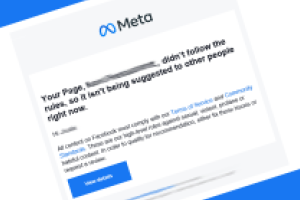Your brand – your company’s identity – should first and foremost be the story that you are telling. Controlling this narrative on the internet isn’t about tricky advertising or whitewashing over gaffs: it’s about being consistent with your brand online. Information about your company can be found numerous places online, so it’s up to you to make sure your branding across all pages and platforms is both consistent and optimized for that space. Let’s talk about what you need to do to make it happen.
What’s in a Brand?
In short, your brand is what allows potential customers to differentiate your business from a competitor’s. This ranges from the obvious – like your logo, to the subtle – like your company’s voice. Online, your brand is all the locations and content within those locations that are accessible to the public. From your website to social media, the venues you’re present on are the key to your business being seen and chosen, and it’s up to your brand to help people make that decision.
The Importance of Brand Consistency
The methods of building the best brands differ with industry and regions, but you know what doesn’t change? The importance of consistency. When we talk about “control” and “management” of a brand, the most important thing is making sure that everything that composes your brand is consistent across the entire internet. Here are the most critical parts:
- Logo: On every platform, you need to make sure you’ve got the same logo. While the constraints of the platform might mean your logo may need to be in multiple dimensions, having different styles or generations of logos on platforms will hurt its recognition.
- Tagline: Not all companies have taglines or slogans, but if you do, it should be consistent as well. The point of a tagline is to be memorable and be synonymous with your company, so make sure it is present and consistent.
- Content: What you say about your company should also be similarly present on all platforms. While some places will have more or less room for the “about” of your business, the summary should be the same.
- Voice & Tone: What you say and how you say it. While different platforms may be more or less causal, having wildly differing voices on two platforms will cause dissonance and make you appear less genuine.
- Imagery & Color: Beyond your logo, many platforms will have additional room for “hero” images and banners. Make sure the imagery is consistent, and that color selection is also consistent with your company colors.
The Tools You’ll Need for Online Brand Management
With the above thoughts on keeping your brand consistent, let’s look at the various platforms you’ll have to manage. Note this doesn’t include your website, as that should act as your baseline. These are platforms that are either automatically generated due to your online presence or where people will look for your business first.
Google Business Listing
Google Search is the single most used platform for people to find a business or service. A big part of this is Google Business, collections of information about businesses that show in search results. From physical location to online presence, this should be one of the first things you claim.
Review Sites
Regardless of industry, people will review your business. Putting aside the positive and negative, it’s important to note for many of these, a page will be generated for your business even if you didn’t set it up. As such, it’s important to claim this page and practice good reputation management.
- Yelp: Most services, especially restaurants.
- Trip Advisor: Restaurants, hospitality industry, and tourist destinations.
- Google: All businesses.
Social Media
Leaping into social media – especially as an already established brand – can be daunting. But it’s also vital. Social media is such a pervasive part of online culture, and it’s another place people will check for your presence. Even if you don’t post regularly to any, think about having at least the basic set up on one or more.
- Facebook: Much like individuals, most businesses should have a Facebook page. Not only is this a useful place to funnel people back to your site, but it also is a place people will leave reviews.
- LinkedIn: If you’re planning on hiring employees, having a LinkedIn page for your business is key. It will be not only a place people will look but also one where potential employees will connect with you.
- Instagram, Twitter, Other Platforms: Depending on your time and industry, it can pay to invest in social media marketing and advertising on these platforms, especially if that’s where your target audience lives.
It’s important to control your brand online to provide a consistent and accurate representation of your business, but it’s also a lot of work. Between upkeep on social media and untangling third-party generated pages, you might need some help. Think about contacting Vision today. Not only can we help you manage your brand on a global scale, but we can also provide managed social media and reputation management. It’s time to take control.




